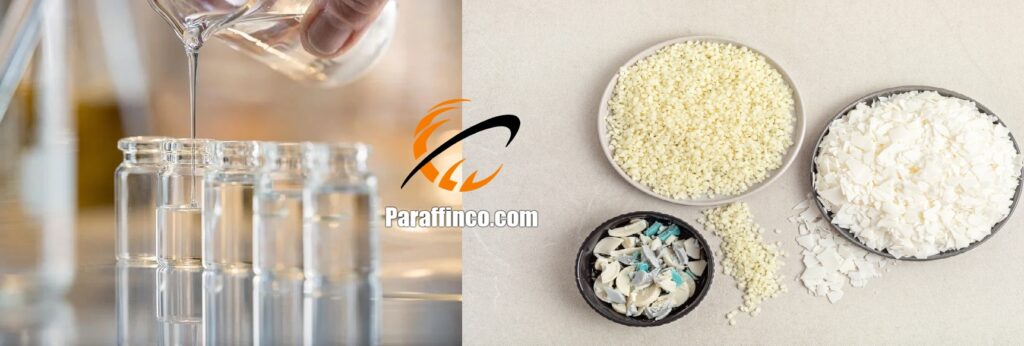Paraffin Vs. Wax: Understanding the Differences and the Role of Paraffin Co. as Your Trusted Supplier
What is the difference between Paraffin and Wax? When it comes to discussing materials used in various industries, terms like “paraffin” and “wax” often come up. While these terms are sometimes used interchangeably, they are not synonymous. In this article, we will delve into the differences between paraffin and wax, highlighting their properties, uses, and the importance of sourcing them from a reliable supplier like Paraffin Co. as Your Trusted Supplier of Paraffin and Wax in Dubai, UAE
What is Paraffin?
Paraffin is a type of hydrocarbon derived from petroleum. It is a white, odorless, and waxy solid that is commonly used in various industries due to its unique properties. Here are some key characteristics of paraffin:
- Chemical Composition:
Paraffin is primarily composed of saturated hydrocarbons, which makes it stable and non-reactive under normal conditions. - Melting Point:
Paraffin has a relatively low melting point, typically ranging from 46°C to 68°C (115°F to 154°F), depending on its grade and purity. - Odorless and Colorless:
Pure paraffin is odorless and colorless, making it suitable for a wide range of applications where color and scent are undesirable.
What is Wax?
Wax is a general term that refers to a variety of organic compounds that are solid at room temperature and become liquid when heated. While paraffin is a type of wax, not all waxes are paraffins. Here are some types of waxes:
- Natural Waxes: Beeswax, carnauba wax, and soy wax are examples of natural waxes derived from plants and animals.
- Synthetic Waxes: These are waxes produced from petroleum or other chemicals, such as paraffin wax and polyethylene wax.
- Mineral Waxes: These include waxes like ceresin and ozokerite, which are derived from mineral sources.
Differences Between Paraffin and Wax: Paraffin Vs. Wax
While paraffin is a type of wax, there are several key differences between paraffin and other waxes:
- Source:
Paraffin is derived from petroleum, whereas other waxes can be derived from natural sources like plants and animals, or synthetic sources. - Chemical Composition:
Paraffin is primarily composed of saturated hydrocarbons, while other waxes may contain additional compounds, such as esters, alcohols, and fatty acids. - Melting Point:
Paraffin has a relatively low melting point compared to some other waxes, making it easier to handle and process. - Odor and Color:
Pure paraffin is odorless and colorless, whereas other waxes may have a distinct odor and color due to their natural or synthetic origins.
Uses of Paraffin and Wax
Both paraffin and other waxes have a wide range of industrial and commercial applications due to their versatile properties. Here are some common uses of paraffin and wax:
- Candle Making:
Paraffin and other waxes are widely used in candle making due to their ability to hold fragrance and color, and their clean-burning properties. - Cosmetics and Personal Care Products:
Paraffin & waxes are used in the production of lipsticks, creams, lotions, and other cosmetic products to improve texture, stability, and shelf life. - Food Industry:
Paraffin and food-grade waxes are used in the food industry as coatings for fruits and vegetables, glazing agents, and in the production of chewing gum and candy. - Pharmaceuticals:
Paraffin is used in the production of ointments, creams, and medical devices due to its non-reactive and skin-friendly properties. - Industrial Applications:
Paraffin and other waxes are used as lubricants, mold release agents, and in the production of polishes, waxes, and sealants.
Paraffin Co. as Your Trusted Supplier of Paraffin and Wax in Dubai, UAE
When it comes to sourcing quality paraffin & wax for your business, choosing a reliable supplier is essential. Paraffin Co. stands out as a leading supplier of paraffin and wax, offering a wide range of grades and specifications to meet the diverse needs of its clients. Here’s why Paraffin Co. should be your preferred supplier of paraffin & wax:
- Quality Assurance:
Paraffin Co. is committed to delivering high-quality paraffin and wax products that meet international standards. Their rigorous quality control processes ensure that you get a consistent and reliable product every time. - Wide Range of Products:
Whether you need paraffin for cosmetic formulations, food-grade waxes for the food industry, or industrial waxes for lubricants and sealants, Paraffin Co. offers a comprehensive range of paraffin & wax grades to suit your specific requirements. - Competitive Pricing:
Paraffin Co. offers competitive pricing on their paraffin & wax products, making them a cost-effective choice for your projects. - Expertise and Support:
With years of experience in the paraffin & wax industry, the team at Paraffin Co. has the expertise and knowledge to assist you with product selection, application guidance, and technical support.
Conclusion
Paraffin Vs. Wax, While paraffin is a type of wax, it is essential to understand the differences between paraffin and other waxes to make informed decisions for your business. Both paraffin and wax have versatile properties and find applications in various industries, making them indispensable materials. Paraffin Co. emerges as a trusted and reliable supplier of paraffin & wax, offering high-quality products, competitive pricing, and exceptional customer support. Whether you’re involved in candle making, cosmetics, food industry, or industrial applications, Paraffin Co. has the right paraffin and wax solution for you. So, the next time you’re in need of quality paraffin & wax products, look no further than Paraffin Co. With their commitment to quality, expertise, and customer satisfaction, you can rest assured that you’re getting the best value for your money. Paraffin Co. as Your Trusted Supplier of Paraffin and Wax in Dubai, UAE
You can Read More about this product Here
If You have any other Query or Question you want to ask, Please don’t hesitate to Contact Us

